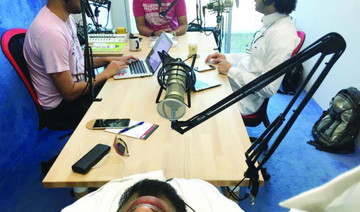LONDON: Digital media is big business in the Arab world. Per-capita, the region has one of the highest viewing figures in the world for mobile video, and smartphone use is nearly universal. But one format that has found success in other markets appears to be lagging behind in the Middle East: the humble podcast.
Globally, in recent years, podcasts have emerged from their niche status and found wider audiences. They’re particularly popular with younger listeners and especially well-suited to deep dives into topics that that just don’t get attention in traditional radio formats. But adoption rates vary wildly across the world. A Reuters Institute report this year illustrated this gap, with 58 percent of respondents in South Korea saying they’d listened to a podcast in the last month, compared with 18 percent in the UK.
The popularity of podcasts in the Arab world is hard to gauge, as few formal studies have been commissioned. The landscape appears to still be in its pre-industrial phase, relying on a handful of passionate and driven creators across the region to keep moving forward.
However, a trend is taking root in the Middle East that echoes one of the ways podcasts elsewhere have been able to thrive: networks. 
One of the biggest names in Arabic-language podcasting is Jordan-based Sowt. “We specialize in narrative-driven audio, rather than interview-based shows. A lot of people in the region do interviews, which are easier to produce.” says co-founder Ramsey Tesdell. “Narrative-driven content is really taking off. It’s more engaging, you can tell different stories in a way that really speaks to people. There’s more of a plot and character. There’s an antagonist. Pinnacle point, climax. It works better for an on-demand audience.”
Tesdell suggests the reason podcasts aren’t yet getting larger numbers in the region is because the Arabic-language offering isn’t there — a familiar complaint about all digital media in the Arab world; entrepreneurs in the sector are seemingly more comfortable with focusing on English-language content, despite indications that the appetite for Arabic content is huge.
It is notoriously hard to specify what constitutes a “successful” podcast. Heralded outliers like “Serial” or “This American Life” (which averages 1 million downloads per episode) may have skewed expectations. On average, the top five percent of podcasts in the US get around 14,000 listens per episode. In that context, “Eib” — Sowt’s flagship show about taboos in the Middle East, which gets 10,000 to 20,000 downloads per episode — is a resounding success.
For Tesdell, the strategy for the future is clear. “We want to focus on a couple of programs and turn them into bigger name shows across the region. And we want to work with people in the sector to promote each other’s shows and create live events.”
Live events could provide an important touch point with audiences — and an essential revenue-stream for a medium that is famously difficult to advertise on successfully. All the networks we spoke to said they were keen to start doing them.
Financing is a major problem. Audio production is costly. For Sowt, the answer has, for some time, been grants, but that reliance appears to be waning. “We get a decent amount of grants,” Tesdell explains. “But this year we’re 40 percent supported by services. And we’re working on bigger contracts. Grants will always be part of our business model but we are moving away from that.”
“Kerning Cultures” is another successful narrative-driven show from the region, this time in English — although there are plans to release Arabic episodes in the future. Founder Hebah Fisher says, “Our primary audience is the region itself and its diaspora, and then a non-Middle Eastern audience looking to better understand the region.”
The show, which averages 5,000 listens per episode, has echoes of “This American Life” or “RadioLab.” It feels like a great way into the Middle East for a foreign audience.
Fisher says the show’s business model is based on ads, branded content, syndication, and memberships. “More and more brands in the region are starting to wake up to podcasts and how effective (they are at reaching) the audiences they care about,” she claims.
The deeper you dive, the more you realize that the Middle Eastern podcast landscape, far from lagging behind peers elsewhere in the world, is actually quite diverse and exciting.
On the more informal and conversational end of things you’ll find Saudi Arabia’s Mstdfr network. For co-founder Ammar Sabban, getting into podcasts was completely natural. “I always liked them. We just started with the idea of doing one show,” he says. “A few months later Uber came onboard as a sponsor, and we built a studio and the idea of a network came about.”
“The Mstdfr Show,” the network’s flagship, is coming up on its 100th episode. Close to 70 percent of its audience — which averages 20,000 a month — is in Saudi Arabia. And that audience has been built, according to Sabban, solely on word-of-mouth.
“Because we’re offering something different to everything out there, people show up,” he says. “We don’t push the show. It’s pure fandom.”
But its success is no accident. It is designed to feel like hanging out with a group of friends, which is why it favors the panel format. Just a couple of people around a mic.
For Sabban, everything about the show comes down to sincerity. When they sat down to record the first episode, he remembers they were trying hard to speak exclusively in Arabic. They’d even pause recording to go find the right word from time to time. But that felt inorganic, so they decided to embrace their childhoods growing up in the US, and throw in some English when it felt warranted.
“We just said, ‘Whatever, let’s just speak the way we do. This is who we are.’ Those who speak like us find it great but others hate it. But it’s ok if it isn’t for them. And, actually, over time our Arabic has gotten better, so we have also naturally moved away from English,” Sabban says.
One thing is clear, the podcast scene in the Middle East, although small, is alive and well. And it is growing. Building on the passion of these pioneers, others feel emboldened to enter the fray. Rhea Chedid is a young entrepreneur in the process of setting up her own podcast network out of Beirut.
“Podcasts are so intimate. You’re telling a story into someone’s ear,” she says. “I want to tell stories from the region that I don’t feel are being told. There are so many people in the region already doing amazing things and I want to join in on the fun.”
















